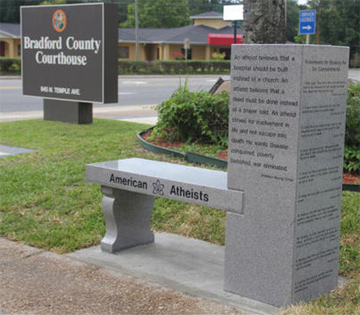In last week’s edition of To the Source, “Atheists Flood the Public Square” told the story of a new atheist monument recently erected outside a Starke, Florida courthouse. The American Atheists weren’t able to get the court to remove the Ten Commandments monument previously set up by a local Christian men’s group. So they adopted a new strategy, challenging it with one of their own ~

In a sidebar to the article, Benjamin Wiker discusses the various inscriptions on the chunk of granite. The front is inscribed with this quote from atheist activist Madalyn Murray O’Hair (1919-1955) ~
“An Atheist believes that a hospital should be built instead of a church.
An Atheist believes that a deed must be done instead of a prayer said.
An Atheist strives for involvement in life and does not escape into death.
He wants disease conquered, poverty vanished, war eliminated.”
Wiker ably refutes these statements, one-by-one;
First Line:
“An Atheist believes that a hospital should be built instead of a church.”
Very profound – profoundly confused, that is. The truth is that if there had not been churches, there would never have been hospitals. There were some precursors to hospitals in ancient cultures, but they were rare. The pagans had a very different notion of how to care for the sick. When plagues broke out, as in the plague of Alexandria in 250 A.D., the pagans fled and left the dying to die alone. Christians on the other hand, followed Christ’s commands, and ran to the sick, rather than away from them – even the pagan sick.
It was after the Council of Nicaea in 325 A.D. that, under the direction of the newly-converted emperor Constantine, construction of hospitals in every cathedral town was begun. Again, this effort was undertaken because of Christ’s command to care for the poor, sick and dying. The later construction of Islamic hospitals was done in imitation of Christianity, and with the help of Christian physicians. Hospital building blossomed throughout the Middle Ages, and continues down to the present day. In America today, one in six patients are cared for in Catholic hospitals.
Second Line:
“An Atheist believes that a deed must be done instead of a prayer said.”
That may be true, but a Christian believes that a prayer should be said and a deed done. The two go together and always have. As Jesus made profoundly clear in Matt 25:31-46, the sheep will be separated from the goats, at the time of judgment, and only the sheep will enter the Kingdom of God. The sheep are the ones who fed the hungry and thirsty, welcomed strangers, clothed the naked, cared for the sick, and visited those in prison.
Third Line:
“An Atheist strives for involvement in life and does not escape into death.”
As the previous quote from Jesus should make obvious, Christians are commanded to involve themselves in this life, so that their “escape into death” (and ultimately from it) will have a happy result. And we note as well that it was Christianity that, against accepted pagan Roman practices, rejected suicide. Today, the leading proponents of “escape into death,” or more politely, euthanasia, are secular atheists (such as Derek Humphry and his Hemlock Society).
Fourth Line:
“He wants disease conquered, poverty vanished, war eliminated.”
So, the atheists are saying that Christians want to spread disease, poverty and war – the same Christians who invented hospitals, were commanded to care for the poor, and who have Christ’s command to love their enemies? Atheists are fond of thinking that Christians are the great war makers of history, citing the Wars of Religion of the 16th and 17th centuries. But as I point out in detail in my “Worshipping the State,” the number killed in religious wars is miniscule compared to the number killed in the great secular wars of the 19th and 20th centuries. And even smaller when compared to the number slaughtered by the great atheist regimes of the 20th century.
Wiker goes on to rebut the inscriptions on the other three sides of the monument, all of which are further attempts to validate non-belief, primarily by rewriting history. The atheists’ proclamations are rife with cherry-picked facts, straw men, false assumptions and general nonsense.
For example, the left side of the pillar includes a quote from the 1797 Treaty of Tripoli. It’s an obscure statement, written by a relatively unknown junior envoy, in a dusty old document – taken totally out of context. Its author, one Joel Barlow, actually included a footnote to his statement to prevent it from being misunderstood (or deliberately misrepresented by American Atheists in the 21st century!).
(Dave Miller Ph.D. has a very detailed explanation of the Treaty of Tripoli and atheists’ attempt to use it to undermine our Judeo-Christian foundations – HERE.)
Here’s a quote that should have been included on the monument:
“Our (Marxist) program necessarily includes the propaganda of atheism.”
~ Vladimir Lenin ~
~~~~~~~~~~~~~~~~~~~~~~~~~~~
It’s a good bet that the members of American Atheists have never seen Kirk Cameron’s 2012 film “Monumental,” which tells the story of America’s religious roots beautifully.

But then most non-believers are content with a distorted view of history, it’s consistent with their distorted worldview.
Related:
There’s always hope for the atheists among us ~ From Mad Marxist to Compassionate Conservative.
With God all things are possible.





Pingback: The dark end of atheism | Designs on the Truth